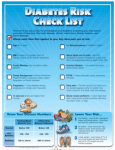Pancreatic Cancer and Diet
Here at Food and Health, we will be observing public health week by bringing you updates on health, all week long! Today we're focusing on pancreatic cancer, a dangerous disease that seems to be linked to diet. Being diagnosed with pancreatic cancer is very serious. In fact, very few people who are diagnosed with pancreatic cancer live more than a year or two after the diagnosis. Even when it's caught early, before the cancer has spread, the prognosis is not great. 77% die within 5 years. Last year, about 37,500 Americans died of pancreatic cancer, which is the most ever recorded in a single year. If current trends continue, pancreatic cancer may soon pass breast cancer as the third most common cancer killer of Americans.
High Insulin Levels May Promote Pancreatic Cancer
Obesity, insulin resistance, type 2 diabetes, and a diet high in fatty meats and dairy products have all been associated with an increased risk of developing pancreatic cancer (1). A study in Sweden, which followed over 75,000 people for 7.2 years, found that consuming more sugar significantly increased the risk of developing pancreatic cancer. People who added sugar to their food and drinks at least 5 times per day had a 69% increased risk of pancreatic cancer compared to those who did not add sugar to their food (2). Consuming dietary sugar in beverages has also been linked to weight gain and the development of type 2 diabetes in several studies. A recent case-controlled study done in Italy examined the diets of 326 pancreatic cancer patients and the diets of 652 healthy people and found that those consuming the most soluble fiber were 60% less likely to get pancreatic cancer. Those consuming more insoluble fiber were 50% less likely to get pancreatic cancer (3). This study and earlier studies have shown that fiber from fruits and vegetables appears to have more of a protective effect than fiber from grains (4).A study that followed men for 16.7 years found that those who had higher levels of insulin, blood glucose, and insulin resistance at the start of the study were more likely to develop pancreatic cancer (5). Both men and women with type 2 diabetes are known to have at least double the risk of developing pancreatic cancer as those without diabetes. However, the risk of developing pancreatic cancer is far higher for type 2 diabetics who inject insulin and/or use sulfonylurea drugs (whichlower blood sugar by increasing blood insulin levels) to lower blood sugar levels than for those who rely largely on metformin (which lowers blood sugar levels and insulin levels). One study showed metformin users were 62% less likely to develop pancreatic cancer than those using insulin and sulfonylureas (6). It appears higher insulin levels and perhaps the accompanying elevated insulin-like growth factor may play a major role in promoting pancreatic cancer.A study that followed 190,045 people for 7 years found that those who ate the most processed meats, as well as those who consumed the most beef, pork, and lamb, had a 50-68% increased risk for pancreatic cancer (7). Red meat, and particularly processed meat, intake is also linked to an increased risk of developing type 2 diabetes (8).
Bottom Line
Since pancreatic cancer is nearly always fatal, an ounce of prevention is worth far more than expensive medical treatments. It is increasingly clear that a rich Western diet that leads to weight gain earlier in life, and the development of insulin resistance and type 2 diabetes also likely promotes the development of pancreatic cancer. Exercise, weight loss, and a diet high in whole grains, fruits, vegetables, beans with little or no processed meats and red meats, coupled with fewer refined carbohydrates, appears best for those interested in avoiding pancreatic cancer -- the most deadly of all the common cancers. Such a diet would also likely reduce the risk of colorectal cancer and other ills associated with a low-fiber, modern diet.By James J. Kenney, PhD, FACN
References:
- J Nat Cancer Inst. 2009;101:1001:11
- Am J Clin Nutr 2006;84:1171-6
- Ann Oncology 2012;23:264-8
- Internat J Cancer 2005;114:817
- JAMA 2005:294;2872
- Gastroenterology 2009;137:482-8
- J Natl Cancer Inst 2005;97:1458
- Pan, A. et al. Am J Clin Nutr. 2011;94:1088-96
Brought to you by: TheNutritionEducationStore.com. Check out posters, PowerPoint Shows, games, and handouts that all discuss health, diet, exercise, and much more!




